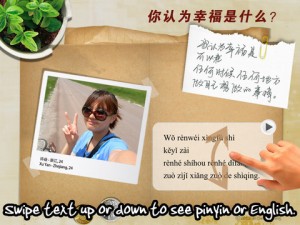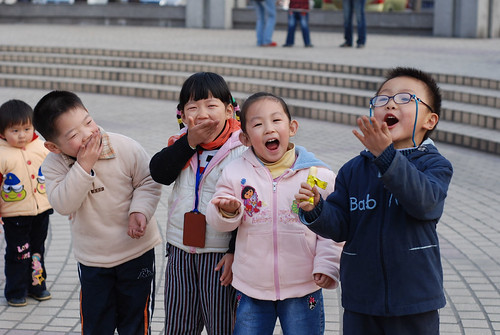20
May 2013Interview by Furio
Furio of the Sapore di Cina blog recently interviewed me about the Chinese Grammar Wiki and AllSet Learning in general. He had some great questions, and I really like how the interview turned out. Check it out: Interview with John Pasden, the founder of Sinosplice and AllSet Learning [also in Italian, in Spanish].
The interview includes a number of questions I’m frequently asked these days by foreigners in China. Here’s an example from the interview:
> You are married with a Chinese girl, have a daughter and opened a company in China. Do you ever think about going back to U.S.?
> Of course. I’d be lying if I said I never think about it. I think about it not because I’m tired of China and want to go back, but rather because I suspect there may come a time when it just really doesn’t make any kind of sense for me (and my family) to stay. Ecological, economic, or political disasters could definitely befall China. You can’t be a responsible parent if you haven’t at least thought about a plan B.
> That said, I don’t have plans to leave China anytime soon. I’m still having a great time here, loving the experience of building my own company, and sincerely hope that I can be here for quite a while.
13
May 2013More “more”
Photo by @biesnecker:
The original character is, of course, 多 (“more”).
(Specifically, “50% more more.”)
09
May 2013OF COURSE Radicals
Please excuse a short rant.
Guys, you have to learn radicals if you want to learn to read Chinese characters. You have to.
I bring this up because over and over again, I run into claims of a “secret” to or a “new method” for learning Chinese: radicals. Yes, it’s a bit of information you might not know when you first take an interest in Chinese, so it’s definitely worth stating explicitly to any new learner. But it’s not a “revolutionary way” to learn Chinese. It’s one of the fundamental building blocks of the Chinese written language. In fact, the Chinese themselves coud not possibly commit to memory the huge quantity of characters that literate adults know if the system did not somehow build on itself (through semantic elements and phonetic elements).
So it’s not “this great way to learn Chinese”; it’s the only way to really learn Chinese characters, unless you’re going to stop at a few dozen. Just as one does not typically learn to read English by skipping the alphabet, or begin studies in classical music by skipping musical notation, one does not tackle reading Chinese without learning about radicals.
(The latest place I ran into this “secret” was a TED talk called ShaoLan: Learn to read Chinese … with ease!)
Could we use new ways of learning Chinese characters? Absolutely. But radicals, or variations of Heisig’s method are not new. Learning thousands of characters is not effortless however you slice it. But it’s totally worth it!
So yes, learn radicals. Not because they’re some new idea, but because if you’re planning to learn Chinese in all its orthographic splendor, they’re one form of ancient Chinese wisdom that you simply can’t afford to ignore.
07
May 2013Shanghai bishop Aloysius Jin Luxian
There’s a lot of talk in the Shanghai Catholic Church about recently deceased bishop Aloysius Jin Luxian (金鲁贤). It’s kind of a shame, because he seems like a really interesting man, but I didn’t really hear much about him while he was still alive. Probably mostly my fault, but nothing to do now but educate myself.
From the description of his recently published The Memoirs of Jin Luxian, Volume 1: Learning and Relearning 1916-1982:
> Jin Luxian is considered by many to be one of China’s most controversial religious figures. Educated by the Jesuits, he joined the Society of Jesus and was ordained priest in 1945 before continuing his studies in Europe. In 1951 he made the dangerous decision to return to the newly established People’s Republic of China. He became one of the many thousands of Roman Catholics who suffered persecution. Convicted of counter-revolutionary activities and treason, he was imprisoned for 27 years and only released in 1982. His subsequent decision to accept the government’s invitation to resume his prior role as head of the Shanghai Seminary and then assume the title of Bishop of Shanghai without Vatican approval shocked many Catholics.
From Wikipedia:
> Bishop Jin was ordained bishop without Vatican approval in 1985, but this was later granted by the Vatican in 2004.
The book is very new, and there are no reviews for the book on Amazon yet. Anyone read it? (It’s nowhere to be found in Amazon.cn, which I suppose is a good sign?)
Oh, and here’s a little taste of the political drama that is Catholicism in China (via the LA Times):
> Jin’s first anointed successor as acting bishop, Joseph Xing Wenzhi, resigned last year for reasons still unclear, and his replacement, Thaddeus Ma Daqin, was placed under house arrest at Shanghai’s Sheshan Seminary after enraging party officials by renouncing his membership in the party-controlled Catholic association.
Further reading:
– Keeping Faith by Adam Minter on The Atlantic (2007)
– Jesuit Bishop Jin of Shanghai, Who Worked to Rebuild Church, Dies at 96 on Jesuit.org
– China: Secretary of State note on death of Bishop Jin Luxian on Vatican Radio
02
May 2013Support Phonemica!
My linguistically-inclined friends at Sinoglot have been quietly building out an amazing project called Phonemica. What’s Phonemica?
> Phonemica is a project to record spoken stories in every one of the thousands of varieties of Chinese in order to preserve both stories and language for future generations. We are a team of volunteers working within China and abroad.
> Our mission: Bringing the richness of oral Chinese to a wider audience, through the words of natural storytellers, from every corner of the world where Chinese is spoken.
Phonemia is beautifully designed, has great audio content in various Chinese dialects, and has a really cool custom audio player/annotator to boot. If this interests you at all, you should really check it out.
But there’s more! Phonemica has recently launched an indiegogo campaign to continue the mission and expand the project. Support Phonemica while you still can so that Phonemica can chronicle China’s linguistic riches while it still can.
24
Apr 2013Reasons for (and against) Code-Switching
NPR has a blog called code switch now, and recently published an article called Five Reasons Why People Code-Switch. I recommend you read it in full if you’re at all interested in the linguistic phenomenon of code-switching, but for the purposes of this blog post I’ll some up the five reasons listed:

Photo by ROCPHOTO.CO.UK on Flickr
1. A certain language feels more appropriate in a “primal” state
2. To fit in to a certain linguistic environment
3. To be treated “like a local”
4. To communicate in secret
5. It helps convey a concept more “native” to a certain language
Code-switching is a well-researched linguistic phenomenon, and you can go into it way deeper than the NPR article does (just check out the references of the Wikipedia article on code-switching).
But while in Beijing over the weekend, I was reminded of another aspect of code-switching: it can be annoying. Although the act of code-switching is generally accepted as “normal,” there are still limits. People can code-switch too rapid-fire, or for “the wrong reasons.” (Alas, the Wikipedia article does not comment on “when code-switching gets annoying.”)
So assuming that non-comprehension isn’t a factor, what are the circumstances under which code-switching becomes annoying? I would guess that a flagrant violation of reason #5 above would be the most annoying… switching to another language to express a thoroughly generic concept, rather than for a “culturally justified” reason. Worse yet: doing that repeatedly. This was the one that came up in my recent conversation.
I’m curious, though, what factors might also make code-switching annoying. Some thoughts:
1. Code-switching too often, and for no discernible purpose
2. Code-switching which seems to be for the purpose of showing off
I’m pretty tolerant of code-switching, though. Maybe you readers have other reasons to add?
18
Apr 2013Reactivation (character art)
I’m planning a trip to the Shanghai Power Station of Art, and I couldn’t help but notice (and appreciate the cover design for a book called Reactivation. Can you read what it says on the cover?
(You’ll need at least an Intermediate level of Chinese to know the words, but even a high elementary-level student should have learned most of the characters, in theory.)
OK, to prevent anyone from getting too frustrated, here’s the Chinese:
重新发电
I’m looking forward to seeing more Chinese creativity at the Power Station of Art.
16
Apr 2013Chinese Numbers: Where 4 Meets 6
This post is leading up to another longer post on how the Chinese write numbers. I don’t mean the Chinese character numbers (一、二、三、四、etc.); I’m talking about the numbers we call Arabic numerals. In China, they can occasionally be written pretty differently from what an American like me is used to.
An example to prove the point:
I won’t post my own observations in this blog post. Feel free to contribute your own interpretations in the comments (and tell us where you’re from), and, more importantly, ask your Chinese friends to do it and post those results too.
I’ve done this little experiment with a number of people, Chinese and non-, and have gotten surprisingly varied replies (but with some identifiable patterns).
If you enjoy this kind of thing, be sure to check out Sinoglot’s classic Bowl, Plate, Plowl.
09
Apr 2013Your Little Sister Is Popular
Over the past year or so the expression 你妹 (literally, “your little sister”) is pretty popular. You might guess that it’s kind of dirty, based on other common vulgar phrases involving mothers or grandmothers, and you’d be kind of right. It’s clearly not a polite phrase, but it seems to be more often used in a flippant way among friends rather than a vulgar way to start fights.
One of the means by which the phrase 你妹 is getting more exposure is through the crazy popular new game “找你妹” (literally, “Look for Your Little Sister,” although that’s not how the name is really understood). I first noticed this game a couple weeks ago while riding public transportation. I’m seeing it played on iPhones and iPads everywhere around Shanghai. It’s especially interesting to me because it looks so lame, despite being so popular. You basically scroll through a bunch of little drawings of objects, and click on the ones you’re told to find. Whee.
It looks like this:
There’s even a video on YouTube about how a kid played 找你妹 all night and went blind. (Well, I guess there are allegedly more embarrassing ways to go blind…) You can see footage of the game in action in parts of the clip:
As for the recent upsurge in usage of the phrase 你妹, it’s kind of interesting, and Baidu offers an explanation (in Chinese, of course). I’m not going to try to explain it because I’m not personally super familiar with all the nuances of its usage yet, but this is exactly the type of situation where having a group of young Chinese teachers on staff comes in super handy, so I’m going to have to get into this topic in the AllSet Learning office. (Anyone interested in it or have a link to an explanation as good or better than Baidu’s? The other explanations I could find were a bit lacking.)
03
Apr 2013If You Could Ask Chinese College Kids Anything…
The AllSet Learning Chinese Picture Book Reader iPad app comes preloaded with several free “books.” Although I immensely enjoyed creating a story involving post-apocalyptic steam punk dinosaurs, in some ways those free books were the most interesting. That’s because the content of each book is a simple interview question which is then answered by 10 different Chinese college kids. They’re all studying in Shanghai, but they come from all over China. You get to hear each young person’s own voice, see their photo, and even read their actual handwriting (in characters), which is also accompanied by text. This is a lot more interesting than most textbooks the kids are using these days! Through this app, it’s my hope to show a diverse, modern side of China’s youth, different from other sources.
We’ve aimed for intermediate level learners in the past, but we would consider doing simpler or more difficult questions. The interview questions already included in the app are:
1. 你最喜欢吃什么? (What do you most like to eat?)
2. 谈到美国,你第一个想到的是什么? (When speaking of the USA, what’s the first thing you think of?)
3. 你认为幸福是什么? (What do you think happiness is?)
And this is the part where I ask you, my readers, what types of questions you’d like us to ask for the next round of interviews. The questions need to be relatively short, and somewhat open-ended, but nothing requiring an essay to answer. It’s OK to get just a little bit into the human side of politics (One Child Policy, etc.), but we’re not going to do any particularly inflammatory topics, or topics that could get the interviewees in trouble.
So what questions would you like to see covered in the Chinese Picture Book Reader? Please share in the comments, or drop me an email if you like.
01
Apr 2013School’s out for April Fool’s Day
It’s April Fool’s Day (愚人节), and I don’t have anything special, but I just thought I’d share this cute photo I saw online:
Here’s the original text:
> 放学了好开心
> 老胡快走~
> 好的~
> 我收拾一下书包
Here’s the text with punctuation (and pinyin tooltips added):
> 放学了,好开心!老胡,快走!
> 好的。我收拾一下书包。
And the translation:
> School’s out. I’m so happy! Lao Hu, hurry up!
> OK. Just packing up my book bag.
Have a good April Fool’s Day, 童鞋们 (that’s cutesy talk for 同学们).
27
Mar 2013Chinese Grammar Funnies
I saw an interesting Chinese forward called 小学生造句 (“elementary school students make sentences”). Obviously, the sentences produced are not exactly what the teacher was looking for. Here are some of the more amusing ones (some understanding of Chinese grammar may be required):
- 难过 [dictionary link] [grammar link]
我家门前有条水沟很难过。
(There’s a ditch in front of our house that’s hard to cross.) - 又……又…… [grammar link]
我的妈妈又矮又高又胖又瘦。
(My mom is both short and tall and fat and thin.) - 一边……一边…… [grammar link]
他一边脱衣服,一边穿裤子。
(He took off his clothes while putting on his pants.) - 天真 [dictionary link]
今天真热!
(Today it’s really hot!) - 先……再…… [grammar link]
先生,再见!
(Sir, goodbye!) - 其中 [grammar link]
我的其中一只左脚受伤了。
(One of my left feet got hurt.) - 况且 [dictionary link]
一列火车经过:“况且况且况且况且况且况且况且”。
(A train passed by: clanka clanka clanka clanka clanka clanka clanka.)
Photo by rbn_hu on Flickr.
22
Mar 2013Classroom Culture Clash

photo by LeeTobey
A friend in Beijing recently reported an exchange with his Chinese tutor to me that went something like this (embellished by my own imagination and translated into English):
> Friend: So today I’d like to talk about the air quality in Beijing.
> Tutor: I really don’t want to talk about that. You foreigners come to China, and all you want to talk about is how bad the air is, or how the food is unsafe. There’s really a lot more we could talk about. China is an immense country with a long history and rich culture. We don’t even have to talk about China. There’s so much more we could talk about than just complaining about the air quality here.
> Friend: I’m hiring you to help me improve my Chinese, and I want to talk about Beijing’s terrible air quality. So that’s what we’re talking about today.
> Tutor: …
Unsurprisingly, it wasn’t the greatest tutoring session. But just that little piece of dialog recounted by my friend contained quite a few layers of cultural expectations. (A thoroughly enjoyable exchange, from my perspective!)
19
Mar 2013Gang gang gang gang gang
Although never studying it too diligently, I’ve always suspected that the syllable “gang” plays a prominent role in Shanghainese. Then I got this forward which proves it (see image at right). Don’t spend too much time trying to make sense of the Mandarin; it’s just a silly story about 江江, 杠杠, 傻傻, and 岗岗 calling each other dumb (傻). And yes, it’s pretty contrived. But the Shanghainese version is hilarious.
If you can read Chinese, you might be amused by the image (focusing on the latter half). But you’ll definitely want to hear the audio I had my Shanghainese wife record:
Ganggang.mp3 (1.1 MB)
Here are text transcripts (and keep in mind that the Shanghainese “transcript” doesn’t reflect any official way of representing Shanghainese in written form; it’s mostly just approximately phonetic characters chosen to exaggerate how ridiculous the Shanghainese sounds to non-speakers):
普通话版 (Mandarin version):
> 江江和杠杠说,傻傻刚才说岗岗说他竟然说他傻。
> 杠杠和江江说,江江你傻。
> 傻傻说岗岗傻,岗岗说傻傻傻。
> 岗岗傻傻都傻。
> 刚才傻傻还说你江江傻,岗岗也是这么说的。
> 江江说岗岗傻傻说什么?
> 他们说我傻?他们才傻。
上海话版 (Shanghainese version):
> 刚刚邦刚刚刚,刚刚刚刚刚刚刚刚一刚一刚一刚。
> 刚刚邦刚刚刚,刚刚侬刚。
> 刚刚刚刚刚刚,刚刚刚刚刚刚。
> 刚刚刚刚豆刚。
> 刚刚刚刚还刚侬刚刚刚,刚刚阿斯个能刚。
> 刚刚刚刚刚刚刚刚啥?
> 伊拉刚吾刚一刚?伊拉才刚。
Note: Both the Mandarin and Shanghainese texts have been edited slightly from the original image to correct for errors and inconsistencies (and in one case, to better reflect the audio version).
12
Mar 2013Spot the Difference between these Identical Phrases
One of our star teachers at AllSet Learning recently shared this with me:
大学里有两种人不谈恋爱:一种是谁都看不上,另一种是谁都看不上。
大学里有两种人最容易被甩:一种人不知道什么叫做爱,一种人不知道什么叫做爱。
这些人都是原先喜欢一个人,后来喜欢一个人。
网友评论:壮哉我大中文!!外国人绝对看不懂~!
This is definitely a tricky one, and you’re not likely to be able to appreciate it if you’re not at least the intermediate level. So forgive me for not providing pinyin and translations for everything.
Like many jokes, this joke relies on ambiguity. Understanding the different sentences requires some understanding of semantic ambiguity, syntactic ambiguity, and lexical ambiguity.
Here’s what’s going on:
大学里有两种人不谈恋爱:一种是谁都看不上,另一种是谁都看不上。
谁都看不上 can be interpreted as either “doesn’t like anyone” or “isn’t liked by anyone.” You’re not normally going to see both meanings used in one sentence!
大学里有两种人最容易被甩:一种人不知道什么叫做爱,一种人不知道什么叫做爱。
This is a parsing issue, and revolves around the word 叫做 being a synonym for 叫: “叫做 爱” (“to be called love”) vs. “叫 做爱” (“to be called making love”). In spoken Chinese, you would definitely pause to verbally insert the “space” that I have typed above.
这些人都是原先喜欢一个人,后来喜欢一个人。
So 一个人 can be interpreted as both “a person” and “[to be] alone.”
网友评论:壮哉我大中文!!外国人绝对看不懂~!
You can’t really praise Chinese for having ambiguity; every language does. And what one human mind can encode, another can decode (native speaker or not!).
05
Mar 2013Typing Chinese in Gmail (Google’s Web IME)
I was surprised to discover a new little dropdown option in the Gmail menu bar today, with the Chinese character 拼 on it (for 拼音, pinyin). After playing with it, it became clear that it’s an in-browser input method–a way to type in Chinese characters. Most people install Chinese IMEs at the operating system level (Chinese input is supported by Windows, Mac OS, and Linux now), but now Gmail is offering a way to type pinyin without the OS-level IME. It’s all in the browser. What’s more, it’s surprisingly fast. It’s pretty much exactly like using Google Pinyin for Windows, which I used to love, but gave up when I switched to using a Mac. This is very cool.
It’s not only for Chinese, though:
I’m not sure why it was auto-enabled for me, but if you’d like to try it out, just open up your Gmail settings. It’s right at the top:
More info from Google here. (Thanks, Luke, for that link!)
01
Mar 2013Chinese Type: Playing with Perspective
I just discovered this really cool “perspective effect” on Behance:
[Note: This is an animated GIF, so if you’re not seeing animation, you’re not seeing the effect.]This is sort of similar to the Chinese/English ambigrams I’ve written about before.
26
Feb 2013Creating Characters by SVG
A new project called SVG Hanzi (SVG 漢字/SVG 汉子) allows anyone to piece together an image of a character by specifying its structure and component parts. Very cool!
From the site:
> SVG Hanzi is a web service that can be used to obtain a picture of any Chinese character in SVG format.
> It is only necessary to visit a link that looks like http://svghanzi.appspot.com/[Character Code].
> Character Code here should consist of an Ideographic Description Character ⿰, ⿱, ⿲, ⿳, ⿴, ⿵, ⿶, ⿷, ⿸, ⿹, ⿺, ⿻ or △
(Those weird symbols above represent the main structural patterns of Chinese characters, such as ⿰ for 知, ⿺ for 道, etc. △ is used to denote structures like 品 or 鑫.)
In case it’s not clear, this tool allows you to construct a character by just sticking a string of symbols and characters into a URL, which is then output as an SVG image.
Some examples (click through to view the resulting SVG character output in a pumped-up font size):
– http://svghanzi.appspot.com/⿻丨口
– http://svghanzi.appspot.com/⿴囗玉
– http://svghanzi.appspot.com/△木木木
Those are all actual characters, of course. I quickly realized that this tool can be used to contract the character creations I love so much (and used to do the hard way, in Photoshop):
– http://svghanzi.appspot.com/⿺辶心
– http://svghanzi.appspot.com/△品品品
– http://svghanzi.appspot.com/⿰女囧
– http://svghanzi.appspot.com/△囧囧囧
Finally, since SVG Hanzi doesn’t force you to use only character components as input (and Unicode character will work), I couldn’t resist these “hacks” (I’m using screenshots just in case SVG Hanzi ever goes down and to not hit the server so hard, but in each case, the image was originally output by SVG Hanzi and then captured by screenshot):
This all reminds me of the Character Description Language created for Wenlin, only simpler, and more universally accessible, since it uses a simple string of symbols to create an SVG, which all modern browsers can display.
Anyway, SVG Hanzi is a very cool tool, and I’m glad to see this. Not sure if it will ever be capable of representing really complex characters, but it’s already impressive as is!
Thanks to @magazeta for introducing me to this project.
21
Feb 2013First Look at Google Glass and Chinese
I’m pretty into geeky tech stuff, so I’m excited about Google Glass. On the new promo site, though, I noticed this strange photo:
My first thought was, “where can you buy vegetables in Chinese by the pound?” Must be in Chinatown in the U.S.
I showed this to my wife, and her immediate reaction was, “they wrote the 苗 in 豆苗 wrong.”
If you’re using Google Glass to buy vegetables in Chinese in Chinatown in the U.S., I’d imagine you’re setting yourself up for quite a language power struggle. Much better to use Google Glass to record your interactions as you learn Chinese by using it (and possibly while getting realtime help from Google Glass).
Wow, I would love for AllSet Learning to be a part of an initiative like that! We’ll see how long it takes us to get our hands on Google Glass and onto the streets of Shanghai…
20
Feb 2013The Challenge of Stimulating Curiosity (in China)
Since our baby was born in 2011, I’ve resisted the urge to flood my blog with baby topics. But as our little one learns to talk and begins to explore the world around her, I can’t help but delve into issues of first language acquisition, bilingualism, and culture. These are all topics I’ve thought about before, but never have I had such powerful motivation to really dig into them.

Photo by Maristela.O on Flickr
I recently read this in an issue of Growing Child newsletter:
> Many studies performed on both animals and humans have shown that exposure in the early years to surroundings that are dull and monotonous can permanently reduce curiosity.
> This results in a vicious circle of intellectual poverty where lowered curiosity resulting from inadequate stimulation leads to still less curiosity, and so on.
I’d be interested to see what the “many studies” were, exactly (leave me a message if you know!), because these two paragraphs strike me as particularly relevant to China.
When I think of my own childhood and look at my daughter’s so far, it’s not hard to apply “dull and monotonous” to a (relatively) small Shanghai apartment, the lack of a backyard, the lack of an open natural environment to explore, etc. I won’t even get into the obvious problems with the local school system.
In addition, here in China the fostering of creativity is often presented as something that needs to be accomplished within schools. In reality, children’s natural curiosity needs to be nurtured much earlier, before the “vicious circle of intellectual poverty” begins.
Is it still possible to stimulate curiosity in children while living in China? Of course! I have no doubt that it is. It just means parents here have to work a bit harder than my mom could get away with: “go outside and play.”
























